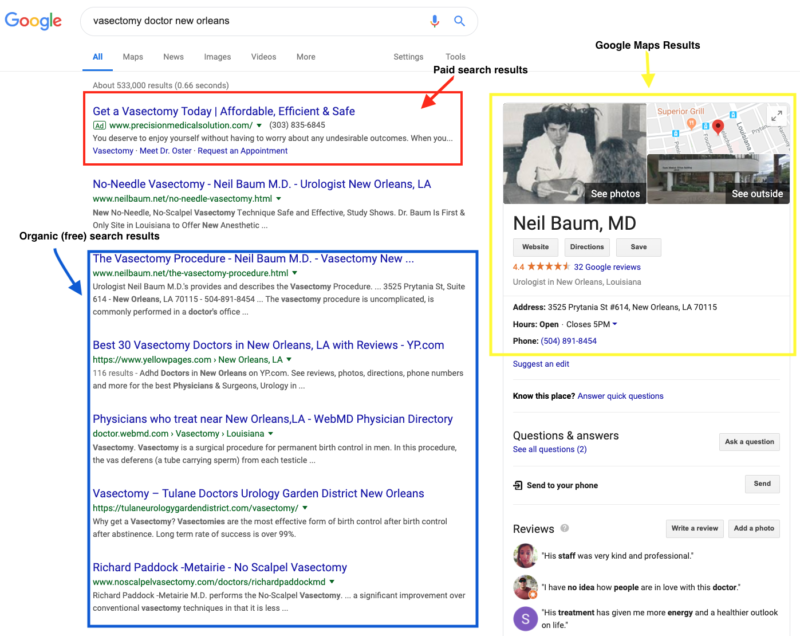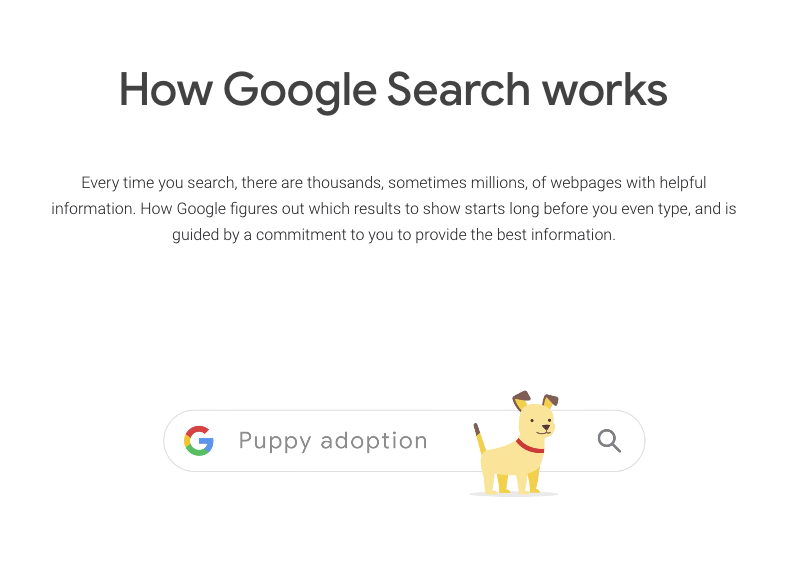Website? Check. Search engine optimization (SEO) applied to content so Google finds and shares it with potential patients? …
If you are still using the Yellow Pages to attract patients to your practice, then you are in the dark ages. The same age as leeches, ledger cards and the lucky rabbit’s foot. It is time that you move your practice into the 21st century.
Let’s assume you already have a website (I sure hope so). However, just having a website is not going to be sufficient unless your patients – particularly potential new patients – are able to find you and your practice. That means showing up in results on Google and other search engines when people enter search terms like “symptoms of urinary tract infections.” This blog will discuss how search engine optimization (SEO) can get your web content to the top of Google search results, and whether that is something you want to attempt yourself or hire an expert to execute.
What is SEO?
Search engine optimization refers to techniques that help your website rank higher in organic search results (meaning unpaid and not via an ad). Unpaid is the whole point to SEO, because Google rewards websites that have useful content with high organic search results. The essence of SEO is providing good content, and drawing attention to it in the appropriate ways.
The highest organic search result is when your practice is the first link suggested by Google when someone types in “symptoms of urinary tract infections.” This is free delivery of potential patients looking for topics through a search engine, Google being the supreme one.
You want to pay for traffic or get it free?
Search engine results pages (SERPs) display both organic (free) and paid search results. For paid search results, you can buy ads (shown in the below image in red) located at the very top and very bottom of the SERPs that list your website when someone types in a specific keyword or phrase used in your ad.
Organic or natural search (shown in the below image in the blue box) is in between the paid results and is free. But you have to earn it with useful content, packaged the way the Google bots like to crawl it. Google Maps results (highlighted in yellow) are also often shown on SERPs. On a desktop or laptop, these results will be to the right of the paid and organic listings (shown in the below image) and on mobile, the Maps results will be shown immediately below the paid ads – making Maps results very important for people searching on a smartphone.

What’s the reality of search engines?
If you type a topic into the Google search window, millions of sites will become visible to you. Google shows a user 10 organic results per page on that topic, as Google interprets the searcher’s request (this is key to SEO, so see the section on keywords below).
Ninety-five percent of users find what they are looking for on the first page and do not go to additional pages. Therefore, if you are not on the first page of Google, your site is not likely to get visited, your phone will not ring, and you will not have new patients to enter your practice.
We have a joke in the SEO world: “Where is the best place to hide a dead body?” The answer, “On page 2 of Google.”
While that joke is a more extreme example, just ask yourself, “When was the last time I clicked on page two and beyond of Google search results?” With rare exceptions, it is unlikely that you click to the second page.
Why social media and review sites are important for SEO
The effectiveness and influence of online social media networking is undeniable. You may notice that when you search for a doctor’s or a practice’s name, sites like Facebook, Yelp, RateMDs and more are among the first page of SERPs. This is why having a social media presence and having a good overall star rating on review sites is imperative.
Additionally, these social networks generate backlinks for your website, helping to improve your site’s natural ranking as well. If you haven’t yet integrated social media or online reputation management into your marketing mix, consider the following benefits of social networking in order to drive new patients to your practice.
- Enhanced visibility in search results.
- Improved interaction and patient education.
- Networking and referrals may increase with social media use.
Getting started with SEO – DIY vs. hiring an SEO expert
The ability to understand SEO and apply it are two different things. Every day we have to decide whether it is better to do it yourself or hire someone to do it for you. SEO and website building fall into this sphere.
Going DIY? Here are a few basic questions to ask yourself about your website when you get started.
- Is my website showing up on Google?
- Do I serve high-quality content to users?
- Is my local business listing showing up on Google Maps?
- Is my content fast and easy to access on all devices?
- Is my website secure?
DIY Google SEO
Begin by setting up your website with Google on Google Analytics, Google My Business, Google Ads and Google Search Console. These sites will ask for information about your domain, your content management system and about your practice.
You don’t have to be an SEO expert or programmer to use these Google tools. This Google tutorial gives you all of the know-how you need to optimize your website: https://www.google.com/search/howsearchworks/ (page pictured below).
Keywords are key
To determine a KW list, simply write down all the treatments and services your practice provides. Once you have that list, you can use the Google Ads keyword planner service to get average monthly search results and determine which keywords will garner more website visits.
For example, maybe you have a webpage titled “Signs of a UTI.” The Google Ads Keyword Planner will tell you that “signs of UTI” gets entered into Google search 27,100 times a month. Sounds good, doesn’t it. But “UTI symptoms” gets searched 201,000 times a month. Which one do you think you should use?
Once you know this information, you can tweak your website content to increase its visibility. Don’t forget to add your locations throughout your website in various areas. Ideally, your city should be listed in the footer of your website so that it shows on all pages. The basic guidelines for DIYers include:
- Make pages primarily for users, not for search engines.
- Don’t deceive your viewers by trying to present a page for what it isn’t using great keywords that aren’t applicable to your page.
- Avoid unethical tricks intended to improve search engine rankings such as keyword stuffing, bait and switch or link buying. A good rule of thumb is whether you’d feel comfortable explaining what you’ve done to a website that competes with you, or to a Google employee. Another useful test is to ask, “Does this help my potential patients? Would I do this if search engines didn’t exist?”
- Think about what makes your website and your practice unique, valuable or engaging. Make your website stand out from others in your area and in your community.
Hiring an SEO expert for search engine marketing
If you are like many physicians and practices, you won’t have the time or expertise to do your own SEO and make it so effective that you are at the top of the first page of Google results. It really takes more expertise and skill than what your office manager’s child who learned to create a webpage in 10th grade can handle, and your IT expert is likely unwilling to do it, because it is in large part a writing and structural function. If you’re in that situation, you should consider hiring a healthcare SEO company to improve your website.
Paying up front to earn those free SEO visitors
Deciding to hire an SEO expert is a big decision that can potentially improve your site and save time. Make sure to research the potential advantages of hiring an SEO firm, as well as the damage that an irresponsible SEO firm can do to your site. Many SEO experts and other agencies provide useful services for website owners, including:
- Review of your site content or structure.
- Technical advice on website development: for example, hosting, redirects, error pages, use of JavaScript.
- Content development.
- Management of online business development campaigns.
- Keyword research.
- Expertise in specific markets and geographies.
Before I became the medical advisor to Vanguard Communications, I was their client. I originally connected with Vanguard at a medical conference a number of years back, when I was a diehard website DIYer. I enjoyed learning about SEO and website development, but as a practicing physician, I did not have the time to dedicate to improving my website as often as I should.
Go with an expert focused on SEO healthcare marketing
Once I hired Vanguard to help with my site, I was able to receive 3-5 new patients every day due to improved SEO results that often placed me at the very top of the Google first page of SERPs. Vanguard even offers a guarantee – I’ve never seen another company do that! If they don’t increase your new patients by at least 15 percent within the first 12 months, they’ll work for free for however long it takes to get to that 15 percent mark! To my knowledge, I don’t think Vanguard has ever had to work for free.
Now, there are thousands of SEO companies and individuals you could choose to hire, but I recommend choosing a firm that has expertise in the healthcare field. Promoting vasectomies and prostate cancer treatment is drastically different than selling clothing and home gadgets. You’ll want someone who knows the nuances of marketing and SEO for healthcare.
If you’re thinking about hiring an SEO expert, the earlier the better. A great time to hire is when you’re considering a site redesign or planning to launch a new site. That way, you and your SEO expert can ensure that your site is designed to be search engine-friendly from the bottom up. However, a good SEO person can also help improve an existing site. But it won’t be as easy as starting with one from scratch for a number of reasons.
Bottom line: Website development, including SEO, is never a finished project. It is like the farmer’s fence: it is always under construction and repair, and always a work in progress. It is vital to your practice success to be on the first page of Google if you want to attract new patients to your practice. DIY or hire an expert in healthcare SEO. If you make SEO in your online marketing a priority, you will be rewarded with more patients. Try it; you’ll more than like it!
Want more practice management advice?
The Wired Practice is Vanguard’s encyclopedia of free practice marketing and improvement resources.

